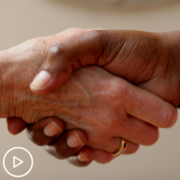What You Need to Know About Lung Cancer Research
What You Need to Know About Lung Cancer Research from Patient Empowerment Network on Vimeo.
As a lung cancer patient, why should you stay informed about research? Expert Dr. Heather Wakelee reviews what patients need to know.
Heather Wakelee, MD is Professor of Medicine in the Division of Oncology at Stanford University. More about this expert here.
See More From the The Pro-Active Lung Cancer Patient Toolkit
Related Programs:

Trustworthy Resources to Help You Learn More About Lung Cancer |

|

Diagnosed with Lung Cancer? Why You Should Seek A Second Opinion |
Subscribe to stay up-to-date in the latest information in Lung Cancer research
Transcript:
Dr. Wakelee:
So, there’s so much happening in lung cancer research now, it is hard to really narrow it down to one thing to be specifically excited about. Where we have made so much progress in particular is with target treatments, and also with immune therapy. So, when we think about the targeted treatments, it’s only been about 15 years since we first learned about drugs that would specifically target the EGFR gene mutations.
And when we found a tumor with an EGFR gene mutation, we then had a medication we could give that would work better than chemo. And now we have five EGFR drugs available in the US. And then we found out about this ALK gene mutation that happen in some tumors. Now we have five drugs that work there. And the with ROS1, that was found, and now we’ve got four drugs that work there that are approved.
And it seems that we keep learning about more and more mutations, so those are mutations called NTRK and BRAF. And with all of those, we now have drug treatments, so it’s been very, very rapid discovery of specific gene mutations and drugs that work for that. And I think we’re continuing to see new targets being identified and new drugs being found.
And also, when those drugs stop working, better understanding why and what we can do to help them work longer, or what we can give next. So, that’s a very active area of research that’s exciting. And then we have the immune therapy. So, the ones that are available so far are drugs that block either PD-1 or PD-L1, and that's one of the really important stop signals for the immune system.
And tumors can use that stop signal to block an immune reaction to a tumor. But if you block that stop signal then the immune system can attack the cancer. So, that's really important, these PD-1, PD-L1 drugs.
We also know about another stop signal called CTLA-4, and there’re drugs that block that as well. And now, where there’s a ton of research is in trying to work with other parts of the immune system, other either pro-immune or anti-immune signals, and changing those in a way where we can improve the ability of the immune system to find the cancer cells and attack the cancer cells.
So, there are many, many studies being done with drugs, and especially in combinations, trying to get that response against the cancer from the immune system to be even stronger. And that’s, I think, where we’re making the most exciting headway now.







